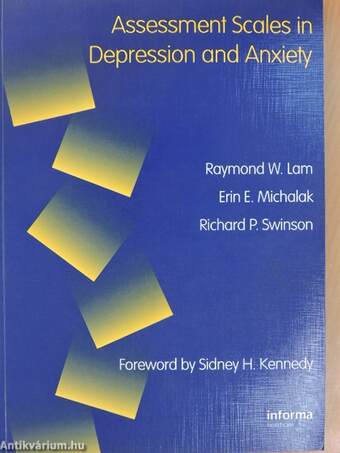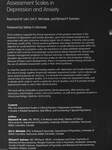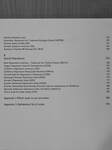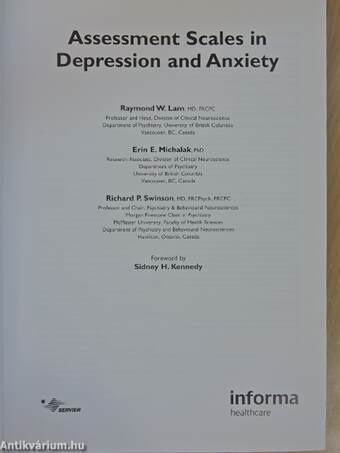1.117.545
kiadvánnyal nyújtjuk Magyarország legnagyobb antikvár könyv-kínálatát
Assessment Scales in Depression and Anxiety
| Kiadó: | Informa Healthcare |
|---|---|
| Kiadás helye: | London |
| Kiadás éve: | |
| Kötés típusa: | Varrott papírkötés |
| Oldalszám: | 194 oldal |
| Sorozatcím: | |
| Kötetszám: | |
| Nyelv: | Angol |
| Méret: | 30 cm x 21 cm |
| ISBN: | 978-0-415-41495-1 |
naponta értesítjük a beérkező friss
kiadványokról
naponta értesítjük a beérkező friss
kiadványokról
Fülszöveg
Assessment Scales in Depression and Anxiety Raymond W. Lam, Erin E. Michalak, and Richárd P. Swinson Foreword by Sidney H. Kennedy Much evidence supports the clinical importance of full symptom remission in the treatment of depression and anxiety disorders, given that residual symptoms are associated with poor outcomes including higher risk of relapse, chronicity, and suicide, and lower quality of life. Clinical practice guidelines now target remission as a primary objective for acute treatment. Because remission is usually defined as scores within the normál rangé on a symptom scale, the importance of using validated assessment scales to track outcome is increasingly recognized as being important for clinical care. Disease management programs to improve outcomes in depressive and anxiety disorders alsó enlist the use of outcome scales as aids for clinical decision-making. Because of these recent developments, there is increasing interest among clinicians in the use of validated... TovábbFülszöveg
Assessment Scales in Depression and Anxiety Raymond W. Lam, Erin E. Michalak, and Richárd P. Swinson Foreword by Sidney H. Kennedy Much evidence supports the clinical importance of full symptom remission in the treatment of depression and anxiety disorders, given that residual symptoms are associated with poor outcomes including higher risk of relapse, chronicity, and suicide, and lower quality of life. Clinical practice guidelines now target remission as a primary objective for acute treatment. Because remission is usually defined as scores within the normál rangé on a symptom scale, the importance of using validated assessment scales to track outcome is increasingly recognized as being important for clinical care. Disease management programs to improve outcomes in depressive and anxiety disorders alsó enlist the use of outcome scales as aids for clinical decision-making. Because of these recent developments, there is increasing interest among clinicians in the use of validated assessment scales in their clinical practices. To meet the needs of clinicians treating patients with depressive and anxiety disorders, this volume brings together empirically validated assessment scales. Such a volume will serve several purposes for clinicians: 1) to illustrate the assessment scales used in clinical trials and research studies; 2] to show how to select an assessment scale, and to decide which scale to use for a particular clinical situation; and 3) to provide sample assessment scales to use in their clinical practice. This book will be invaluable to psychiatrists, family physicians, other primary care physicians, psychologists, nurses, and sociai workers, as well as to graduate students in clinical psychology, medicine, and nursing. Contents Why Use Assessment Scales in Clinical Practice • Depression and Mania • Anxiety • Related Symptoms, Side Effects, and Functioning • Special Populations Authors Raymond W. Lam, MD, FRCPC, is Professor and Head, Division of Clinical Neuroscience, Department of Psychiatry, University of British Columbia, Vancouver, British Columbia, Canada Erin E. Michalak, PhD, is Research Associate, Department of Psychiatry, University of British Columbia, Vancouver, British Columbia, Canada Richárd P. Swinson, MD, FRCPsych, FRCPC, is Professor and Chair, Psychiatry & Behavioural Neurosciences, Morgan Firestone Chair in Psychiatry, McMaster University, Faculty of Health Sciences, Department of Psychiatry and Behavioural Neurosicences, Hamilton, Ontario, Canada VisszaTémakörök
- Orvostudomány > Ideg, elme > Pszichiátria
- Idegennyelv > Idegennyelvű könyvek > Angol > Orvostudomány
- Pszichológia > Pszichiátria
- Pszichológia > Idegennyelvű > Angol
- Orvostudomány > Ideg, elme > Diagnosztika
- Orvostudomány > Ideg, elme > Idegennyelvű
- Orvostudomány > Orvosi idegennyelvű könyvek > Ideg, elme
- Idegennyelv > Idegennyelvű könyvek > Angol > Pszichológia
Megvásárolható példányok
Nincs megvásárolható példány
A könyv összes megrendelhető példánya elfogyott. Ha kívánja, előjegyezheti a könyvet, és amint a könyv egy újabb példánya elérhető lesz, értesítjük.








